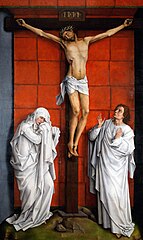Stabat Mater (art)

Stabat Mater (Latin for "the mother was standing") is a feature in the Crucifixion of Jesus in art in which the Virgin Mary is depicted under the cross during the Crucifixion of Christ. In these depictions, the Virgin Mary is almost always standing to the right hand side of the body of her son Jesus on the Cross, with Saint John the Apostle standing to the left.[1] It contrasts with the swoon of the Virgin, where she is seen fainting. This is only seen from the late medieval period onwards.
Stabat Mater is one of the three common artistic representations of a sorrowful Virgin Mary, the other two being Mater Dolorosa (Mother of Sorrows) and Pietà. In the Stabat Mater depictions the Virgin Mary is represented as an actor and spectator in the scene, a mystical emblem of faith in the Crucified Savior, an ideal figure at once the mother of Christ and the personified Church.[2] The depictions generally reflect the first three lines of the Stabat Mater poem:[3]

- "At the Cross her station keeping,
- stood the mournful Mother weeping,
- close to Jesus to the last".
The concept is also present in other designs, e.g. the Miraculous Medal and the more general Marian Cross. The Miraculous Medal, by Saint Catherine Labouré in the 19th century, includes a letter M, representing the Virgin Mary under the Cross.[4]
The Marian Cross is also used in the coat of arms of Pope John Paul II, about which the Vatican newspaper, L’Osservatore Romano, stated in 1978: "the large and majestic capital M recalls the presence of the Madonna under the Cross and Her exceptional participation in Redemption."[5]
See also
Gallery
| Part of a series on the |
| Mariology of the Catholic Church |
|---|
 |
|
|
-
Gentile da Fabriano, c. 1400–1410
-
Rogier van der Weyden, c. 1460
-
Pietro Perugino, c. 1482
-
Gabriel Wuger, 1868
Notes
- ^ Arthur de Bles, 2004 How to Distinguish the Saints in Art by Their Costumes, Symbols and Attributes ISBN 1-4179-0870-X page 35
- ^ Anna Jameson, 2006 Legends of the Madonna: as represented in the fine arts ISBN 1-4286-3499-1 page 37
- ^ Anna Jameson, 2006, page 38
- ^ Ann Ball, 2003 Encyclopedia of Catholic Devotions and Practices ISBN 0-87973-910-X page 356
- ^ L’Osservatore Romano, 09.11.1978







